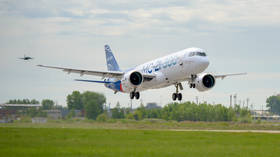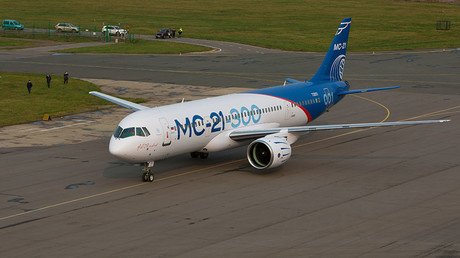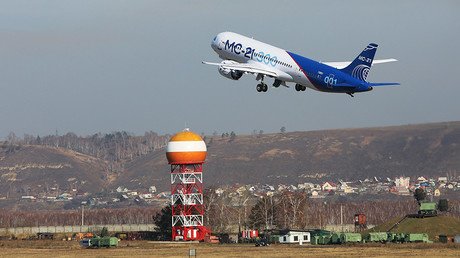New Russian passenger jet to get Russian engines replacing American Pratt & Whitney

Russia’s first post-Soviet large domestic airliner, MC-21-300, has received two of the first 16 domestically-made engines to eventually replace American Pratt & Whitney engines that it currently uses.
The Irkut Division of Russia’s state-run United Aircraft Corporation (UAC), which is in charge of the MC-21-300 airliner project, will reportedly receive the next two PD-14 engines developed by Russia’s Aviadvigatel in the Ural city of Perm within the current year.
So far, the domestically-produced turbofan engine has undergone an audit by the European Aviation Safety Agency (EASA). The manufacturer expects the agency to grant approval for operating jets equipped with PD-14s by the end of the year. This will allow foreign air carriers to buy MC-21-300s powered by Russian engines.
The maiden flight of the Irkut MC-21-300 took place in May 2017. It is scheduled to make its public debut at the Moscow International Aviation and Space Salon (MAKS 2019) later this year.
The Russian-made narrow-body airliner, which is set to complete certification tests by 2020, is expected to challenge medium-haul jets such as Airbus A320neo, Chinese Comac C919, and the troubled Boeing 737 Max. The main competitive advantages of the jet include modest operating costs, which are up to seven percent lower than its competitors. The jet will replace the remaining Soviet-era Yakovlev Yak-42, Tupolev Tu-134, Tupolev Tu-154, and Tupolev Tu-204/214 airliners.
Earlier this year, another round of US economic restrictions banned Japanese and American producers from supplying Irkut with composite materials used for the wings of the MC-21. The Russian producer said it would obtain the material from alternative suppliers in southeastern Asia.
According to initial plans, the Russian jet was to be built using 38 percent domestically-made components. Later, the manufacturer decided to raise the figure to 97 percent by 2022 as part of a government plan to eliminate dependence on imports.
For more stories on economy & finance visit RT's business section














